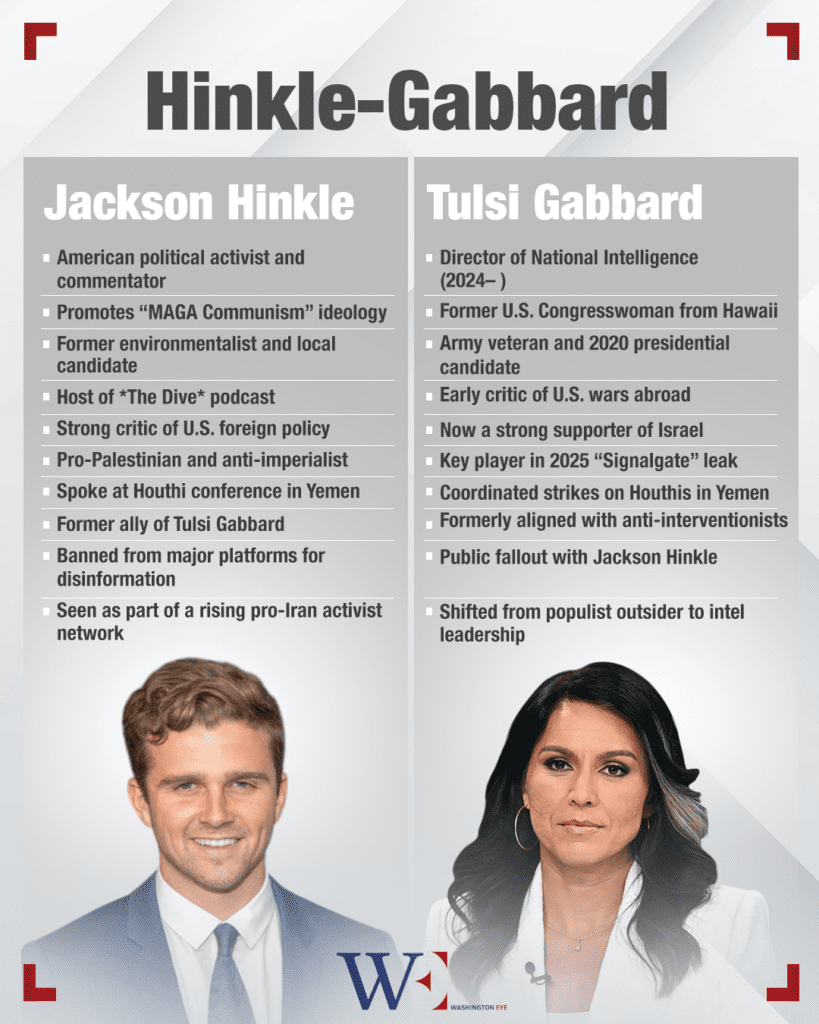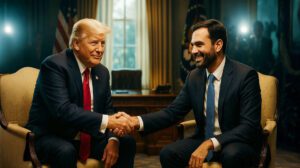In March 2025, a confluence of ideology, personal relationships, and military policy collided on the world stage, symbolized by two figures whose paths once aligned but now represent polar opposites: Jackson Hinkle, a young American political activist, and Tulsi Gabbard, the current Director of National Intelligence. Their divergent positions on the conflict in Yemen, and more broadly the question of Palestinian resistance and Western interventionism, underscore the deep fractures within American political thought and international diplomacy.
At the center of this geopolitical drama was a four-day conference in Sanaa, Yemen, hosted by the Houthi movement under the banner: “Palestine: The Central Issue of the Nation – You Are Not Alone.” Among the international participants were activists, journalists, and political figures drawn from a wide ideological spectrum. Jackson Hinkle stood out not just for his rhetoric, but for what his presence symbolized: a young American, known for his radical anti-imperialist views, sharing a stage with figures from Hamas and Hezbollah, surrounded by imagery and slogans that have sparked global outrage.
Just days earlier, Hinkle had been in Lebanon, participating in a series of memorials and political events tied to Iran-backed militias. His travel to Yemen had not been publicly announced until images emerged from the conference, showing him seated beneath banners bearing the Houthi slogan: “Death to America, Death to Israel, A Curse Upon the Jews, Victory to Islam.”
Hinkle did not denounce the messaging. Instead, he doubled down, delivering a speech calling for resistance to “Western colonialism” and praising what he described as the “resilience of the Palestinian people.”
At the same time, across the world in Washington, Tulsi Gabbard was preparing for military strikes.
In a now-infamous encrypted group chat, a handful of top U.S. national security officials, including Gabbard, discussed an imminent military operation targeting Houthi infrastructure in Yemen. The plan included the launch of F-18 fighter jets, MQ-9 drones, and Tomahawk missiles. Intended to be tightly controlled and highly classified, the operation was inadvertently exposed to the public due to a critical mistake: the group chat, conducted over the Signal app, accidentally included a journalist. The leak, quickly dubbed “Signalgate,” exploded into a scandal, revealing not only operational details but also candid remarks among officials about their disdain for America’s European allies and deep frustration with the region’s unending volatility.
Gabbard, when questioned, acknowledged the breach but insisted that the mission was necessary. To her, the Houthis were not freedom fighters, but proxies destabilizing the region, threatening maritime trade, and endangering American allies. Her critics pointed to the irony: just a few years earlier, Gabbard had run for president on a platform of non-interventionism and had been critical of endless wars. Now she was overseeing intelligence for targeted airstrikes.
Jackson Hinkle, once a Gabbard supporter and vocal advocate for her anti-war credentials, publicly condemned her. He accused her of betraying her principles, of selling out to the same military-industrial complex she once opposed. Their falling out was now complete, played out on the global stage with bombs and speeches.
The personal history between Hinkle and Gabbard adds a layer of complexity to an already tangled narrative. They had met years earlier during Gabbard’s 2020 presidential run, where she attracted support from across the ideological spectrum. Young, media-savvy, and fiercely independent, Hinkle gravitated toward her message. They were photographed surfing together, attending the same rallies, and publicly expressing admiration for each other. At the time, both occupied a nebulous political space: anti-establishment, anti-war, and skeptical of mainstream narratives. But whereas Gabbard moved toward institutional power, accepting roles that placed her within the intelligence and defense apparatus, Hinkle moved further into the radical fringe, rejecting American foreign policy in its entirety.
This divergence mirrors a broader split in political discourse. Gabbard represents a realpolitik worldview, shaped by years of navigating both Congress and the intelligence community. Her decisions, however controversial, are grounded in a belief that the United States must act decisively to protect its interests.
Hinkle, by contrast, sees the U.S. as an empire in decline, and himself as a voice for the voiceless, aligning with movements and governments that oppose American hegemony.
But who is right? Is Hinkle’s presence in Yemen a brave act of solidarity or a tacit endorsement of extremist rhetoric? Is Gabbard’s coordination of military strikes a strategic necessity or a betrayal of anti-war values?
There are no easy answers.
The reality is that both are acting on belief systems shaped by deeply personal experiences and philosophies. Hinkle believes in the inevitability of global resistance to Western imperialism. To him, standing alongside Houthis, regardless of their inflammatory rhetoric, is a necessary stand for oppressed peoples. He sees Gaza not as a battlefield but as a symbol of resistance.
Gabbard, on the other hand, believes in the importance of stability. She sees the Houthis not as victims but as agents of chaos, armed and supported by Iran, threatening not just Israel but regional allies and international trade routes. Her duty, as she interprets it, is to prevent further escalation and protect American interests.
What this moment reveals is that war, especially in the modern age, is not only fought with weapons but with narratives. It is shaped as much by optics and messaging as by missile strikes and drone footage. And both Hinkle and Gabbard are fighting their wars with the tools they know best: speeches, appearances, intelligence, and influence.
What is perhaps most tragic is not their conflict, but the human cost behind it. Yemen continues to suffer. Gaza remains under siege. Civilians, caught between ideologies, die nameless, their stories drowned out by the noise of pundits, politicians, and strategists.
The story of Jackson Hinkle and Tulsi Gabbard is not just about two people who took different paths. It is about the impossibility of clean morality in a dirty world. It is about what happens when friendships collapse under the weight of war. And it is a reminder that in conflict, there are no heroes, only the dead.
The question of who is right becomes irrelevant in the face of loss. What remains is the haunting truth: there is no absolute justice in war, only perspectives.
And from Yemen to Washington, those perspectives are more divided than ever.

















